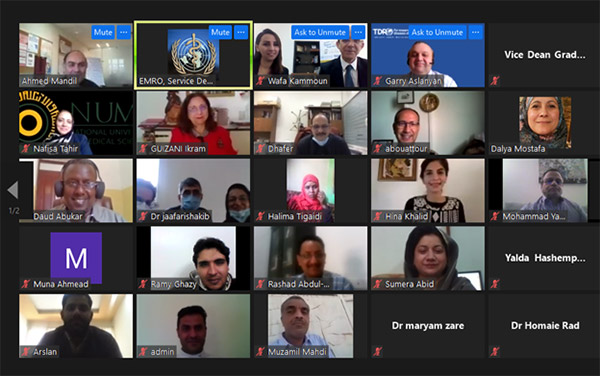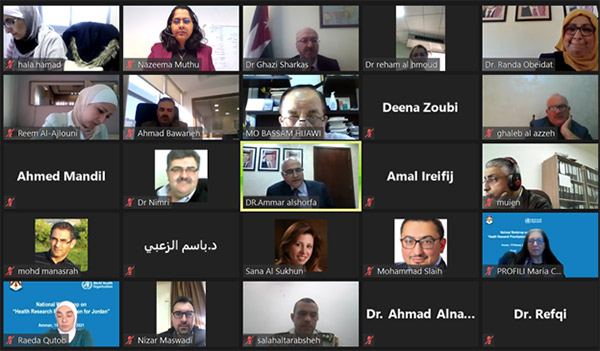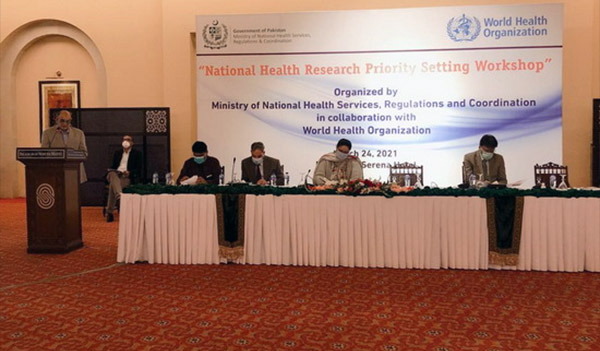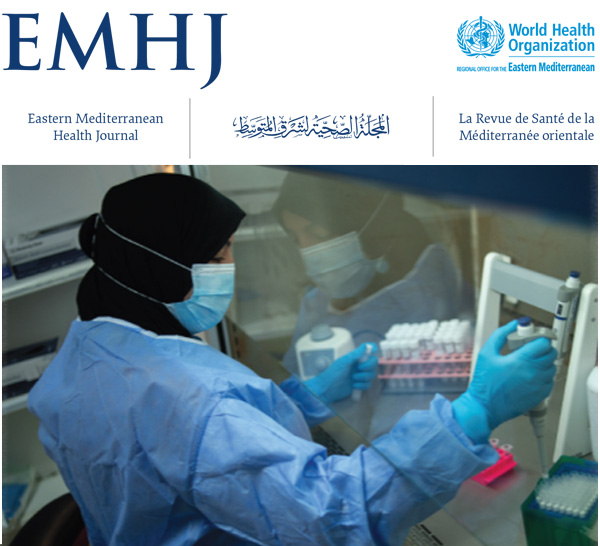
Incident Management Support Team for the COVID-19 response
The research and knowledge management pillar of the IMST aims to enhance the conducting, availability and relevance of ethical research on COVID-19, share lessons learnt from the experiences of countries and, in collaboration with other pillars of the IMST, provide strategic, operational and technical support to enhance national responses to the COVID-19 pandemic. Its achievements in all areas, both at regional and country levels, have made the WHO Regional Office for the Eastern Mediterranean a central player and a global asset in successfully responding to the pandemic.
WHO Solidarity Trial
WHO expert groups recommended mortality trials of four repurposed antiviral drugs — remdesivir, hydroxychloroquine, lopinavir, and interferon beta-1a — in patients hospitalized with COVID-19. Primary analyses examined in-hospital mortality in the four pairwise comparisons of each trial drug and its control showed that such regimens had little or no effect on hospitalized patients, as indicated by overall mortality, initiation of ventilation, and duration of hospital stay. Hospitals and clinicians from Bahrain, Egypt, Islamic Republic of Iran, Jordan, Kuwait, Morocco, Lebanon, Oman, Pakistan, Saudi Arabia were enrolled in the Solidarity Trial and data were shared through the global Solidarity Trial platform.
» Read more
WHO Unity studies
WHO, in collaboration with technical partners, has developed several standardized generic epidemiological investigation protocols branded as UNITY studies. These studies aim to support national public health and social measures, promote the international comparability of research and address gaps in current knowledge regarding the COVID-19 pandemic. WHO extended technical and financial support in the provision of standardized testing kits to Afghanistan, Egypt, Jordan, Lebanon, occupied Palestinian territory, Pakistan, Syrian Arab Republic, Somalia, Tunisia and Yemen. As of April 2021, 15 studies from these countries were implemented in the Region. This includes sero-epidemiological studies among the general population, health care workers, pregnant women and neonates.
» Read more
WHO health workers study
WHO is coordinating a global nested case-control study of health workers exposed to confirmed COVID-19 patients. Its objectives include characterizing virus transmission patterns, risk factors for infection, updating infection prevention and control measures, and reducing secondary SARS-CoV-2 transmission within health care settings. The study is being implemented in Egypt, Jordan, Saudi Arabia and Syrian Arab Republic. It is expected that data collection will be completed by the end of summer of 2021 and subsequent analysis and reporting will follow.

TDR workshop on implementation research methods and ethics
The WHO Regional Office held a virtual workshop on capacity-building in tropical disease implementation research on 23–25 February 2021, in collaboration with the TDR Regional Training Centre, Institute Pasteur, Tunis, to: introduce the concepts of implementation research as it applies to diseases of poverty, share basic statistical analytical techniques, interpretation and presentation of tropical disease research outcomes, explain ethical principles in relation to research on human subjects, and provide necessary knowledge and skills to update TDR grantees’ project proposals.
» Read more

Prioritizing health research in Jordan
On 15 February 2021, a virtual workshop was held on health research prioritization in Jordan. Participants included senior Ministry of Health staff, representatives of academia, United Nations agencies, nongovernmental organizations and the private sector, and WHO staff. The workshop is part of a collaboration between WHO and the Ministry of Health of Jordan based on recent WHO guidance on systematic approaches for undertaking research priority-setting exercises.
» Read more

Prioritizing health research in Pakistan
On 24 March 2021, a national workshop on health research prioritization was held in Islamabad, Pakistan. Participants included senior officials from the Ministry, Director-Generals of provincial ministries of health, senior faculty from academia, representatives of United Nations agencies and nongovernmental organizations, and WHO staff. The workshop is part of a collaboration between WHO and the Ministry of National Health Services Regulation and Coordination based on recent WHO guidance on systematic approaches for undertaking research priority-setting exercises.
» Read more
WHO Collaborating Centre on Case Management for Cutaneous Leishmaniasis: The Dermatology Department of La Rabta Hospital, Faculty of Medicine, University Al Manar 2, Tunisia, was designated in November 2020 as a new collaborating centre.
» Read more
WHO Collaborating Centre on Health Ethics: The Salim El-Hoss Bioethics and Professionalism Programme, American University of Beirut Medical Centre, Lebanon, was designated in January, 2021, as the latest WHO collaborating centre on bioethics (following designation of new centres in Pakistan and Islamic Republic of Iran). The programme is an interdisciplinary resource for faculty, students, health care providers and policy-makers involved in bioethics education, research and consultation in Lebanon and the Region.
» Read more
WHO Collaborating Centre on Mass Gatherings: The Global Center for Mass Gatherings Medicine, Saudi Ministry of Health, Riyadh, was designated as a WHO collaborating centre in April, 2021. This centre is considered a global entity collaborating with WHO in the field of health and management of mass gatherings.
» Read more
Health emergency preparedness and IHR
The WHO Regional Office and the UNICEF/UNDP/World Bank/WHO Special Programme for Research and Training in Tropical Diseases (TDR), in collaboration with the WHO Health Security Preparedness Department, announced a call for applications on “International Health Regulations and health security preparedness”. The deadline for submission of applications closed on 25 June 2021.
» Read more
Migration health
The WHO Regional Office, the Special Programme for Research and Training in Tropical Diseases (TDR), in collaboration with the WHO Global Programme on Health and Migration, announced a call for applications for “Migration health research” in February 2020 to support the generation of related evidence on migrant health needs, concerns and situations, especially implementation research of current programmes or activities focused on the needs of migrant populations. Project proposals from Egypt, Islamic Republic of Iran, Jordan, Lebanon, Morocco, Oman, Pakistan, Palestine, Sudan and Syrian Arab Republic were selected for funding.
» Read more









